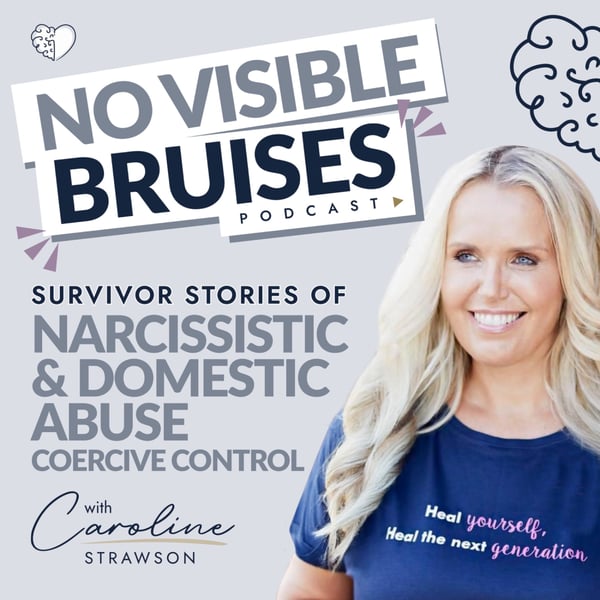The Shame Of Staying With A Narcissist - Just Leave Then!!!
No Visible Bruises
Caroline Strawson
4.8 • 701 Ratings
🗓️ 13 April 2021
⏱️ 14 minutes
🧾️ Download transcript
Summary
In this episode, we will talk about the shame and judgment that those who stay in a narcissist relationship suffer from others and from themselves. We will dive deep into the reasons behind the decision to stay in an abusive relationship, and how to be more compassionate towards those who make such decisions.
What You Will Learn In This Episode:
- How our protective parts don't know what happiness is
- What happens when we hear the phrase ‘Just leave then’
- Safety concerns in case of leaving a narcissistic relationships
- How we can help people who decide to stay in abusive relationships
- The importance of bringing awareness into your internal protective mechanisms
Someone that comes from a place of not feeling worthy is more likely to end up as a codependent in an abusive relationship. In most cases, the fear of leaving that relationship will be greater than their suffering, so they'll choose to stay. Without help, those people can enter the endless cycle of not feeling good enough to leave and, simultaneously, not worthy enough to generate love in their partners.
Resources:
- Join my Facebook group at https://www.facebook.com/groups/thriveafternarcissisticabuse
- Connect with me on Instagram: https://www.instagram.com/carolinestrawson/
Transcript
Click on a timestamp to play from that location
| 0:00.0 | Welcome to the narcissistic abuse recovery podcast. I'm Caroline Stawson and I'll be sharing with you |
| 0:09.2 | awareness, understanding and education about the devastating effects of narcissistic abuse to help you thrive. |
| 0:16.8 | I want you to know that I've been exactly where you are now and I believe you. |
| 0:21.4 | And this show is all about taking you from trauma to transformation. |
| 0:30.2 | In today's episode, I want to talk to you really about a lot of shame and judgment that I see, |
| 0:36.5 | not just from other people, but also from |
| 0:38.8 | those who are being victimized by a narcissist. And that is those who continue to stay in a |
| 0:45.8 | relationship with the narcissist. And this really predominantly is maybe if the narcissist is a partner. |
| 0:52.9 | Equally, it can be brought in if it's a parent or a friend |
| 0:56.1 | or potentially a co-worker. But for the sake of this episode, I'm going to really hone in on that |
| 1:02.5 | partner element because we do see this a lot. And if you think about how someone ends up in a |
| 1:09.5 | relationship with a narcissist in the first place, |
| 1:11.9 | so take me for an example. So I've got two older sisters and I ended up in a 14-year |
| 1:17.3 | marriage in relationship with a narcissist. Now, I absolutely know neither of my sisters |
| 1:22.3 | would have ever ended up in that relationship. Same parents, yeah. So why was it that I stayed for 14 years? Why was it that |
| 1:31.9 | I was a codependent? Well, a lot of this can go down to family dynamics. So I was the youngest |
| 1:37.4 | child. Obviously have two older sisters. My middle sister had a health condition when I was younger, |
| 1:42.9 | which obviously took a lot of attention |
| 1:44.6 | from my parents. So I was the youngest. It's kind of like, hey, hello, what about me? |
| 1:49.2 | Kind of thing. And obviously as I got older and I was trying to get approval, particularly |
| 1:54.5 | from my father, because my mom was a codependent, it was just never forthcoming. So that belief in |
| 2:00.3 | myself then, which got wired in was, |
... |
Please login to see the full transcript.
Disclaimer: The podcast and artwork embedded on this page are from Caroline Strawson, and are the property of its owner and not affiliated with or endorsed by Tapesearch.
Generated transcripts are the property of Caroline Strawson and are distributed freely under the Fair Use doctrine. Transcripts generated by Tapesearch are not guaranteed to be accurate.
Copyright © Tapesearch 2025.

